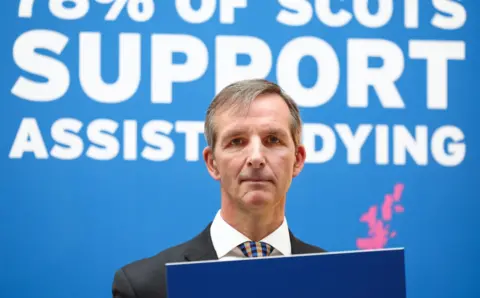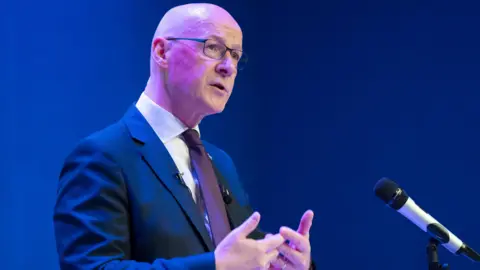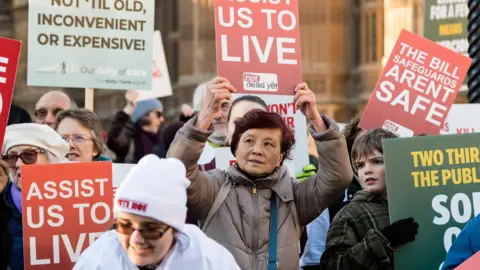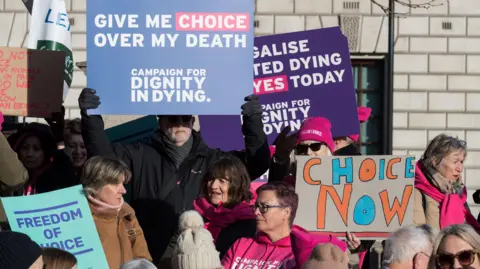Life or death decisions as politicians weigh up assisted dying vote
 Getty Images
Getty ImagesThere are few decisions Holyrood can take that are bigger than a vote on assisted dying.
Whether or not to allow terminally ill adults to seek medical help to end their lives is of fundamental consequence.
The vote on Tuesday will also be of note to decision makers at Westminster, where similar proposals for England and Wales are working their way through the UK parliament.
MSPs have twice before rejected attempts to change the law, most recently in 2015.
The Liberal Democrat MSP Liam McArthur, who has developed the current proposal, believes the mood in parliament is now "very, very different".
He clearly expects his bill to have more support than previous attempts - but that is not the same as saying that he is sure it has sufficient support to proceed.
Speaking on BBC Scotland's The Sunday Show, he said he expected the first vote to be "close".
 PA Media
PA MediaHe could be concerned in part about the potential impact of recent interventions.
First Minister John Swinney has not changed his position over the years.
He has consistently voted against assisted dying and it was no surprise when he revealed that he intends to do so again.
He said that representations in favour of assisted dying from constituents who have witnessed loved ones suffer terribly at the end of their lives caused him to agonise over his decision.
However, he believes that changing the law would unacceptably alter the relationship between doctors and their patients and that it could put pressure on sick and disabled people to end their lives prematurely.
Swinney has also been careful to stress that he has reached a personal view, that he is not seeking to influence others, and the Scottish government will remain "neutral".
Having said that, the Scottish government has already advised that it thinks Holyrood would be exceeding its authority by voting for assisted dying because the law on lethal drugs is under Westminster control.
McArthur argues that these issues could be overcome if Holyrood votes in favour of assisted dying.
Each MSP is free to vote according to their conscience rather than along party lines.
That does not mean the views of party leaders are unimportant. They could well sway the opinion of undecided MSPs.
Scottish Conservative leader Russell Findlay is understood to be "sceptical" about the current bill.
And Scottish Labour leader Anas Sarwar has said he will be voting against, while pressing for greater investment in palliative care.
The Scottish Green and Scottish Liberal Democrat leaders are expected to support the legislation.
 Getty Images
Getty ImagesThe indications are that the vote on Tuesday could be relatively close. There appears to be a sufficient number of MSPs who have not declared their views to swing the decision either way.
Liam McArthur is still having conversations with undecided MSPs in the hope of winning them over.
He argues that not changing the law would let down too many Scots who suffer in the final stages of life to a degree that leaves their loved ones "traumatised".
Some politicians are trying to weigh up the arguments over the weekend. Others intend to listen to the debate in parliament before making up their minds.
If there are more "no" votes than "yes" votes from MSPs on Tuesday the bill will be rejected.
If there are more "yes" votes than "no" votes that is not the last word on the issue.
 Getty Images
Getty ImagesThat would amount to approval in principle. The debate would continue with the potential for MSPs to make changes to the bill to ease concerns.
There would need to be another vote of the whole Scottish Parliament on any final version of the legislation.
The separate bill for England and Wales was backed by MPs in November, but has yet to go to a final vote in the Commons.
One MSP described the assisted dying decision in Scotland as an opportunity for Holyrood to be at its best.
Whatever the outcome, they hope for a heavyweight debate with powerful arguments on both sides and the careful consideration that sensitive matters of life and death demand.
